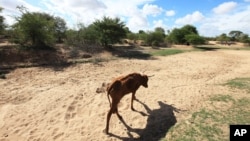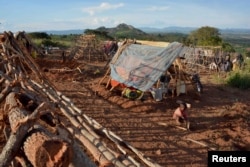Two years ago, the nation of Mozambique was riding high after a peaceful presidential election, the promise of offshore natural gas wealth, and what looked like an end to a long-simmering conflict that arose from decades of civil war.
And then El Nino hit.
The irregular weather phenomenon began in 2015 and battered this heavily agricultural nation with severe floods followed by severe drought.
As if that weren't enough, a resumption of fighting in the nation's center and south, a $2 billion debt crisis and donor pullout have created a perfect storm for those desperate Mozambicans who were affected by El Nino.
Abdoulaye Balde, the World Food Program's Mozambique country director, told VOA News in Johannesburg that the drought cannot be viewed in isolation.
Fighting in central and southern Mozambique has made it harder for the organization to deliver aid, now that it has to beef up security and take more precautions.
Additionally, the recent revelation that Mozambique's previous government secretly took on $2 billion worth of debt has scared donors, Balde said. Several major donors have already pulled their direct government support over the scandal.
"I would think a trust issue has been created between the country and the donors," he said. "We come in and say, look, the country needs help; people need help. A donor might be confusing the government and the people who need it."
However, Balde said the U.N. is talking to major donors who have pulled out — such as Sweden and Britain — about rerouting those withdrawn funds to U.N. agencies that can deliver humanitarian aid. He told VOA the amount might exceed $100 million.
Liesl Louw-Vaudran, a consultant for the Pretoria-based Institute for Security Studies, said Mozambique needs long-term solutions, not just short-term aid. Those solutions, she said, will come when the government can restore security and boost its infrastructure.
"A huge country like Mozambique is suffering also from lack of infrastructure, and the wealth is not being redistributed, especially in the rural areas," Louw-Vaudran said.
Andrew Odero, a regional food security analyst for the WFP, said he fears that weather conditions will worsen before they improve — and that maize prices will hit an "unprecedented" high in southern Africa.
"Looking at the wider macroeconomic context, we also see that in general, inflation rates are high; market prices have more than doubled in particular countries," Odero said. "I'm quite worried about Malawi, Mozambique, Zimbabwe. I'm also worried about countries' fiscal ability to have these additional resources needed to address the need."
He said he expects the next humanitarian assessment, due in early June, to show a greater number of people in crisis as the usually dry winter season settles across the region.












